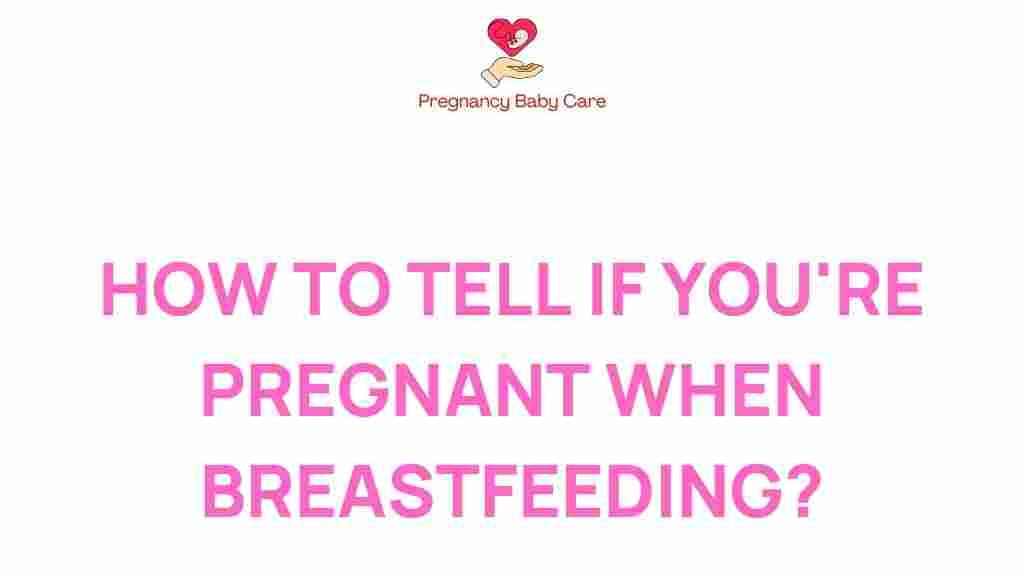Uncovering Pregnancy Signs While Breastfeeding
For many mothers, breastfeeding is a cherished experience, providing both nourishment and bonding time with their infants. However, if you are breastfeeding and suspect you might be pregnant, recognizing the pregnancy signs can be crucial for your maternal health. Understanding how hormonal changes affect your body during this time is essential for every nursing mother. In this article, we will explore the early symptoms of pregnancy while breastfeeding, discuss fertility considerations, and provide valuable health tips for maintaining well-being during this unique phase of motherhood.
Understanding Early Symptoms of Pregnancy While Breastfeeding
Pregnancy signs can manifest differently for nursing mothers compared to those who are not breastfeeding. Hormonal changes that accompany breastfeeding can mask or mimic early symptoms of pregnancy. Here are some common signs you may notice:
- Missed Period: While many breastfeeding mothers experience irregular menstrual cycles, a completely missed period can be a strong indicator of pregnancy.
- Nausea: Morning sickness is a classic symptom, but it can also occur at any time of the day. If you find yourself feeling nauseous frequently, it may be worth investigating.
- Breast Changes: Your breasts may feel fuller, heavier, or more sensitive than usual, even if you are still nursing.
- Fatigue: Increased tiredness can result from both the demands of breastfeeding and potential pregnancy.
- Frequent Urination: Elevated hormone levels can lead to more frequent trips to the bathroom.
- Food Cravings or Aversions: Changes in appetite can be a telltale sign of pregnancy.
Hormonal Changes and Their Effects
While breastfeeding, your body produces hormones like prolactin and oxytocin, which play a significant role in milk production and bonding with your baby. These hormones can influence your menstrual cycle and overall fertility. Here’s how:
- Prolactin: High levels of prolactin inhibit ovulation, leading to irregular or absent periods. This can make it difficult to determine if you are pregnant based solely on your cycle.
- Oxytocin: This hormone not only promotes milk ejection during breastfeeding but also affects mood and bonding. Changes in oxytocin levels can also signal pregnancy.
Though breastfeeding can delay ovulation, it is still possible to conceive if you are nursing exclusively. Being aware of your body and its signals is essential for maternal health.
Fertility Considerations for Breastfeeding Moms
After childbirth, many women are concerned about fertility while breastfeeding. The relationship between nursing and fertility is complex:
- Exclusive Breastfeeding: Practicing exclusive breastfeeding for the first six months can suppress ovulation effectively.
- Supplementation: Introducing formula or solid foods can decrease prolactin levels, potentially leading to the return of ovulation.
- Individual Variability: Every woman’s body is different; some may experience a quick return to fertility, while others may not ovulate for several months.
Keep in mind that even without a regular menstrual cycle, ovulation can occur, so if you are not ready for another pregnancy, it’s wise to consider contraceptive options.
Health Tips for Nursing Mothers
Maintaining good maternal health is crucial during the postpartum period, especially when navigating the challenges of breastfeeding and potential pregnancy. Here are some health tips:
- Stay Hydrated: Drink plenty of water to support milk production and overall health.
- Balanced Nutrition: Consume a well-rounded diet rich in fruits, vegetables, whole grains, and lean proteins to meet the nutritional demands of breastfeeding.
- Regular Check-ups: Schedule regular visits with your healthcare provider to monitor your health and discuss any concerns about pregnancy or breastfeeding.
- Listen to Your Body: Pay attention to any unusual symptoms and consult your doctor if you suspect pregnancy or if you have health concerns.
- Support Network: Join support groups for breastfeeding mothers to share experiences and gain insights from others who have been in similar situations.
Step-by-Step Process to Confirm Pregnancy Signs
If you suspect that you may be pregnant while breastfeeding, follow these steps to confirm your situation:
- Monitor Your Symptoms: Keep a diary of any symptoms you notice, including changes in your body, mood swings, and dietary changes.
- Take a Home Pregnancy Test: If you miss a period or notice significant early symptoms, take a home pregnancy test for a preliminary confirmation.
- Consult Your Healthcare Provider: Regardless of the test result, visit your doctor for a blood test and further evaluation. They can provide guidance on your health and breastfeeding.
- Assess Your Breastfeeding Plan: Discuss with your provider how a potential pregnancy may affect your current breastfeeding routine.
Troubleshooting Tips for Common Concerns
Here are some common concerns nursing mothers may face regarding pregnancy signs and breastfeeding, along with troubleshooting tips:
- If you experience excessive fatigue: Ensure you are getting enough rest and nutrition. Consider asking for help with household tasks or childcare to alleviate stress.
- If you have difficulty breastfeeding: Consult a lactation consultant for tips on maintaining your milk supply and addressing any challenges you encounter.
- If symptoms persist but tests are negative: Seek medical advice to rule out any underlying health issues and to discuss your symptoms.
Conclusion
Recognizing pregnancy signs while breastfeeding requires awareness of your body and its changing needs. Understanding the early symptoms of pregnancy during this time is crucial for maintaining your maternal health. Hormonal changes can complicate the recognition of these signs, but staying informed and proactive can empower you to make the best decisions for yourself and your family. Remember to prioritize your health and consult with healthcare professionals when needed.
For more resources on maternal health and breastfeeding, check out this helpful guide. To learn more about postpartum care, visit this informative site.
This article is in the category Pregnancy and created by PregnancyBabyCare Team
